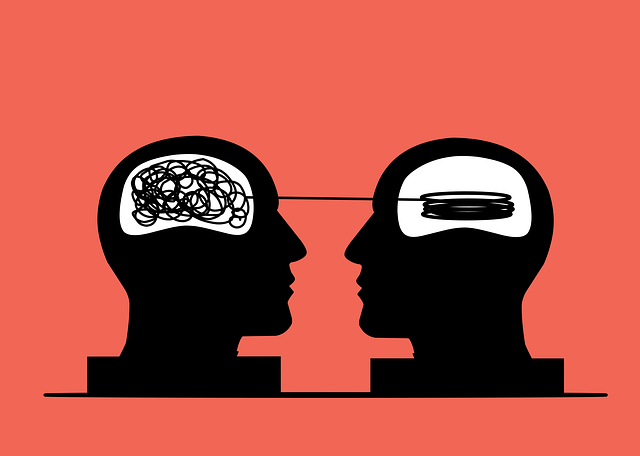Recognizing depression in children is crucial for early intervention, focusing on symptoms like withdrawal and changes in behavior or routine lasting over two weeks. Tailored therapy, including Cognitive Behavioral Therapy (CBT) and compassion cultivation practices, prevents and manages depression in kids with neuro disorders by teaching coping strategies and promoting mental resilience. Lifestyle changes, mindfulness practices, and open communication between parents and children also play vital roles in enhancing emotional well-being and fostering robust support networks for effective depression prevention.
Depression among children is a growing concern, but with proactive strategies, it can be prevented. This article explores essential methods to identify and address depression in kids, focusing on early detection of signs and symptoms. We delve into effective therapy approaches tailored for children with neuro disorders, highlighting cognitive-behavioral therapy and mindfulness techniques. Additionally, we discuss lifestyle changes, coping strategies, and the vital role of supportive networks, including family, friends, and professionals. Understanding these prevention tactics is key to fostering resilient and healthy minds in young individuals.
- Recognizing Depression in Children: Early Signs and Symptoms
- Therapy Approaches for Kids with Neuro Disorders
- Lifestyle Changes and Coping Strategies to Prevent Depression
- Building a Supportive Network: Family, Friends, and Professionals
Recognizing Depression in Children: Early Signs and Symptoms

Recognizing depression in children is crucial as early intervention can significantly impact their long-term mental health. While adults may display obvious sadness or despair, kids often manifest symptoms differently. They might become more withdrawn, experiencing a sudden drop in school performance or showing increased irritability and anger. Changes in sleep patterns, appetite, and energy levels are also red flags, especially if these persist for two weeks or longer.
Therapy for children with neuro disorders plays a vital role in depression prevention. Techniques like cognitive-behavioral therapy (CBT) help young individuals identify and change negative thought patterns. Crisis intervention guidance and risk management planning for mental health professionals are essential tools to support vulnerable children. Building empathy through strategies that connect with kids on their level can foster open communication, enabling caregivers to provide the necessary assistance.
Therapy Approaches for Kids with Neuro Disorders

Children with neuro disorders often face unique challenges that can contribute to depression and anxiety. In such cases, therapy plays a pivotal role in their emotional well-being. One effective approach is therapy for children with neuro disorders, which is tailored to address their specific needs. Cognitive Behavioral Therapy (CBT) is a commonly used method that helps kids identify and change negative thought patterns, thereby reducing symptoms of depression and anxiety. This therapy teaches them coping strategies to manage their conditions effectively.
Additionally, compassion cultivation practices have shown promise in enhancing mental resilience in children with neuro disorders. These practices encourage self-kindness, mindfulness, and understanding towards one’s difficulties, fostering a sense of safety and support. By integrating these therapeutic techniques, professionals can significantly contribute to depression prevention and anxiety relief for young individuals navigating the complexities of their neurologic conditions.
Lifestyle Changes and Coping Strategies to Prevent Depression

Depression prevention starts with adopting healthier lifestyle changes and effective coping strategies. Regular physical activity, a balanced diet, and sufficient sleep can significantly reduce the risk of depression. Engaging in activities that promote emotional well-being, such as mindfulness practices, meditation, or spending time in nature, can also help build resilience against depressive episodes. Additionally, establishing strong social connections and practicing empathy within relationships are crucial components of mental health care.
For children with neuro disorders, therapy serves as a powerful tool for both prevention and management. Crisis intervention guidance and empathy building strategies incorporated into therapeutic practices can equip young individuals with the skills to navigate emotional challenges proactively. By fostering open communication, validating their feelings, and teaching coping mechanisms, parents and caregivers play a vital role in promoting emotional well-being. These proactive measures ensure that children develop healthy coping strategies, enhancing their overall mental health landscape.
Building a Supportive Network: Family, Friends, and Professionals

Building a strong support network is an essential aspect of depression prevention, especially for individuals with neuro disorders. Family and friends play a pivotal role in providing emotional support, understanding, and a sense of belonging. Encouraging open communication within this circle can help identify early signs of distress and allow for timely intervention. Many people find solace in sharing their feelings with loved ones, knowing they have a safe space to express themselves without judgment.
In addition to personal connections, seeking professional therapy is crucial for managing depression effectively. Children with neuro disorders might benefit from specialized therapy sessions tailored to their unique needs. Therapies such as cognitive-behavioral therapy (CBT) and mindfulness practices can empower individuals to develop coping strategies and enhance their overall mental health. Moreover, incorporating compassion cultivation practices and conflict resolution techniques into one’s routine can foster positive relationships and further prevent depressive episodes.
Depression prevention in children requires a multi-faceted approach. By recognizing early signs and symptoms, implementing lifestyle changes, building supportive networks, and exploring tailored therapy options like those specifically designed for kids with neuro disorders, parents and caregivers can significantly reduce the risk of depression. These strategies empower children to develop resilience and cope healthily with life’s challenges.








